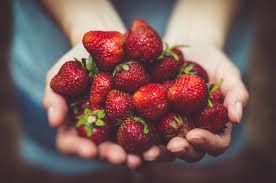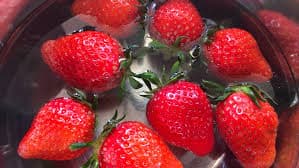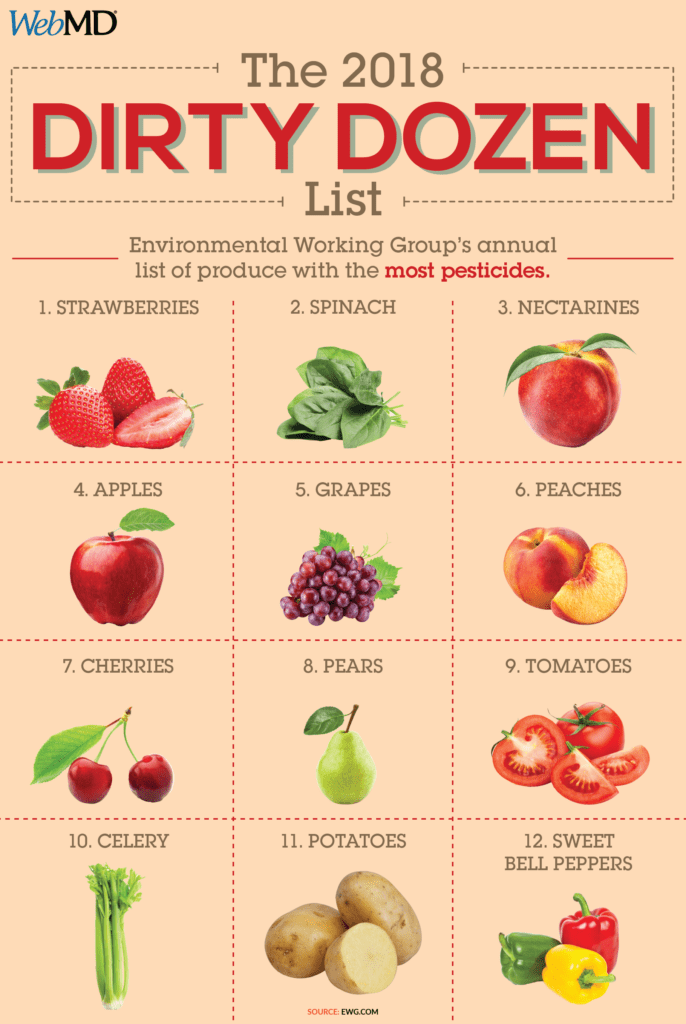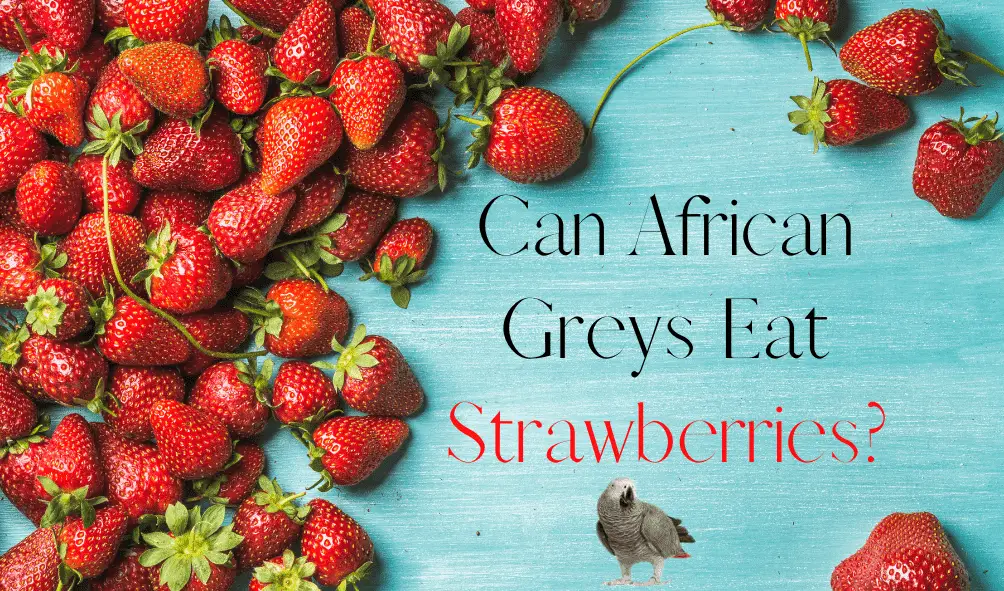Yes! African greys can eat strawberries! However, remember to wash them first! Not only are strawberries delicious for us, but your bird too! Naturally, strawberries are great for your bird! Strawberries are packed full of all sorts of nutrients that can provide a healthy mental state and create the requirements for fighting off diseases like osteoporosis! Pretty great, right?
If that’s not enough, how about reducing stress? Strawberries have a good vitamin C content which is great at helping your bird remain calm! The list of beneficial nutrients doesn’t stop there!

Although fruit and vegetables are only meant to be fed in moderation, try to change it up on a day-to-day basis for your grey to get the full effect of all the many different fruit/vegetables out there!
Table of Contents
- Can African Greys Eat Strawberries?
- The Benefits Of Strawberries For Your Grey!
- Can African Greys Eat Strawberry Seeds?
- Can African Greys Eat Too Many Strawberries?
- What Should An African Greys Diet Be?
- The Dirty Dozen
- Recap
Can African Greys Eat Strawberries?
Yes! African greys can eat strawberries, and there are many reasons why you should introduce strawberries as a tasty treat. Stress relief is a big part of this decision! Birds have tiny, fragile hearts and can get stressed quickly, and one of the great benefits of strawberries is helping to reduce stress and protecting mental health!
*Read on to find out if African greys can eat strawberry seeds!*

Strawberries have a good quantity of potassium which actually helps with helping your bird stay happy and healthy! Although moderation is key with strawberries as they contain fructose. Which in larger amounts can cause stomach problems, which can get watery.
[Read on to see the side effects of strawberry]
The Benefits Of Strawberries For Your Grey!
From helping reduce stress, to potassium which helps strengthen bones! Strawberries have some amazing benefits that just can’t be ignored! For something that you and your bird can share as a snack. Strawberries are defiantly one to add to the meal plan!
In this section, we will be going over the Vitamins and Minerals that strawberries can provide for your bird and exactly how they help your little one!
Let’s look deeper into the nutrients found in Strawberries, and what they can do for your grey!
Vitamin C
- This is an important vitamin for your bird to have. Vitamin C is great at reducing stress.
- Having a Vitamin C deficiency can be detrimental to your little guys’ overall mental health.
- Vitamin C is great for the immune system and creating antibodies! Which will keep your birdie healthy!
Vitamin K
- Vitamin K helps coagulate blood! Hopefully, your bird doesn’t get a cut, but vitamin K helps to clot the blood and slow down the bleeding if the worst does happen.
Potassium
- Potassium is great for aiding the speed of their metabolism, as well as helping strengthen bones.
- This mineral is great for reducing blood pressure while at the same time helping to retain water!
- High Potassium diets help prevent strokes as well as keep diseases like osteoporosis and kidney stones at bay.
Folate
- Folate is needed to make red and white blood cells in the bone marrow. This helps protect against illnesses and carries nutrients around the body.
- Folate is responsible for converting carbohydrates into energy and keeping your grey chatty and playful!
- Not only is it important during infancy but during pregnancy too! Folate is a fantastic vitamin that is responsible for the rapid growth they experience during adolescence.
Can African Greys Eat Strawberry Seeds?
Birds can eat strawberry seeds! Sometimes smaller birds even start with the seeds as it mimics foraging! Although, remember to rinse your strawberries first to get rid of any nasty pesticides that are lingering!
Pesticides are incredibly harmful to your bird and should be removed as soon as possible or at the very least just before feeding your bird any produce!

Very easy to remove pesticides:
- Let your fruits soak for up to 15 minutes.
- Rinse thoroughly and viola.
or alternatively try to buy organic which will limit pesticides used, although I still rinse mine to be safe.
Can African Greys Eat Too Many Strawberries?
Although African greys can eat strawberries, they contain something called “fructose,” which is natural fruit sugar. Due to birds not being able to produce the necessary enzyme to break it down quick enough, it leads to an upset tummy (which can get messy)

Depending on the fructose quantity within the fruit/berry, is how severe the side effects are for your bird. Some fruits have incredibly low levels of sugar and will be no problem whatsoever. However, some may be incredibly high in fructose like strawberries and can lead to diabetes or obesity!
Here are some side effects from too much Strawberry:
Diabetes
Yes! Birds can get diabetes too. Too much sugar, just like with humans, can lead to diabetes, and other diseases and heart disorders. Sugar can be a great treat or a harmful toxin depending on quantity. Before you throw out all sugar, remember moderation. Keep to a slice every so often, and you will keep your friend happy, healthy, and active.
Upset stomachs
Granted, this may only happen the first few times your grey eats strawberries or while they are still developing. Due to the high sugar content, some side effects may include an upset tummy, but it should pass soon! Try to introduce it in smaller quantities at first.
Moderation can be key when you aren’t exactly sure. Don’t worry, in the next section; I will tell you exactly how many strawberries your grey should be eating and what may happen if they have too much!
This leads me on to my next section.
Although strawberries are great for birds, you should remember moderation! One strawberry a week is ideal for your bird. Anything more than once a week and the benefits are wasted and you’re just using up too much valuable stomach space!

If it’s their first time eating strawberries, Cut a strawberry in half and feed them small amounts. Try giving them a quarter strawberry and wait a day to see how their body handles the sugars if their stool is runny try feeding them some more fiber!
Remember to wash them first as they may be covered in pesticides! Try to buy organic when feeding your bird! This leads me on to my next topic!
What Should An African Greys Diet Be?
It is usually recommended that you feed your grey roughly 40% of their body weight in food a day. On average, African greys weigh 500grams so the rule of thumb would be about 150grams of food per day, but this is a rough estimate as all birds are different and have different needs.
Here is a shortlist of the essentials for a birds diet:
- Pellets
- Mixed Fruits
- Foraging Toys
- Daily Fresh Water
Pellets
As for what your grey should be eating, doing some research as well as trial and error will be needed as birds can be frustratingly picky. As a base your grey will need anywhere between 1/2 to 1/4 a cup of pellets to fulfill most of what they need to be happy birdies.
(Seeds should not be their main diet as they lack the nutrition needed for a healthy happy birdie)
Now that we covered what the minimum is for a bird’s diet, let’s add in everything else that’s going to help your bird be all they can be.
Mixed Fruits
Pellets are a great start for your birds’ diet as they cover most of your birds’ nutrition, although they will need more! Here’s where mixed fruit and vegetables come in. Greys need a wide variety of foods to be “complete”.
To name a couple of fruits and vegetables that can do wonders for your birdie: Asparagus, Mango, and Cucumber. These are great choices for your little one to benefit from!
“Remember to remove these from their feeding area daily as they spoil quickly“
Here is a great youtube video that you can learn a lot from! “What Smokey eats & more“
Foraging Toys
This is a must when it comes to bird stimulation as well as creating and maintaining good mental health! Foraging toys mimic how a bird would find food in the wild, not only would it keep them happy and active, it provides exercise for their beaks which needs to be well looked after! Continue to the bottom of the article for our best-foraging toys!
The Dirty Dozen
A CNN article linked “here” says, “After strawberries, the “dirty dozen,” in order, are apples, nectarines, peaches, celery, grapes, cherries, spinach, tomatoes, sweet bell peppers, cherry tomatoes, and cucumbers.” This article is definitely worth a read!

In short, remember to wash your strawberries first to get rid of any nasty pesticides that could be harmful to your bird! Buying organic can help reduce this, but I usually wash them regardless, to be sure!
This leads me to the last and final section.
Recap
If you’ve made it to the end and are now reading the recap! Thank you. In this section, I like to cover the article’s highlights and go over the necessary information!
Can African Greys Eat Strawberries?
Yes! African greys can eat strawberries! However, remember to wash them first! Not only are strawberries delicious for us, but your bird too!
The Health Benefits Of Strawberries For African Greys
From helping reduce stress, to potassium which helps strengthen bones! Strawberries have some amazing benefits that just can’t be ignored! For something that you and your bird can share as a snack. Strawberries are defiantly one to add to the meal plan!
How Much Strawberry Should An African Grey Eat?
Although strawberries are great for greys, you should remember moderation! One strawberry a week is ideal for your bird. Anything more than once a week and the benefits are wasted and you’re just using up too much valuable stomach space!
Can African Greys Eat Too Much Strawberry
Although greys can eat strawberries, they contain something called “fructose,” which is natural fruit sugar. Due to birds not being able to produce the necessary enzyme to break it down quick enough, it leads to an upset tummy (which can get messy)
Can African Greys Eat Strawberry Seeds?
Birds can eat strawberry seeds! Sometimes smaller birds even start with the seeds as it mimics foraging! Although, remember to rinse your strawberries first to get rid of any nasty pesticides that are lingering!
Any Questions you have relating to this article or just for me in general, leave a comment down below in the comments section.
Disclaimer: I am not an expert. Some parrots may react differently to different fruits. Please make sure you always slowly introduce a new food into their diet and keep an eye out for any adverse reactions. If your pet does start displaying symptoms of an adverse reaction, please contact your vet for advice.
Amazon Disclaimer: As an Amazon Associate I earn from qualifying purchases.

